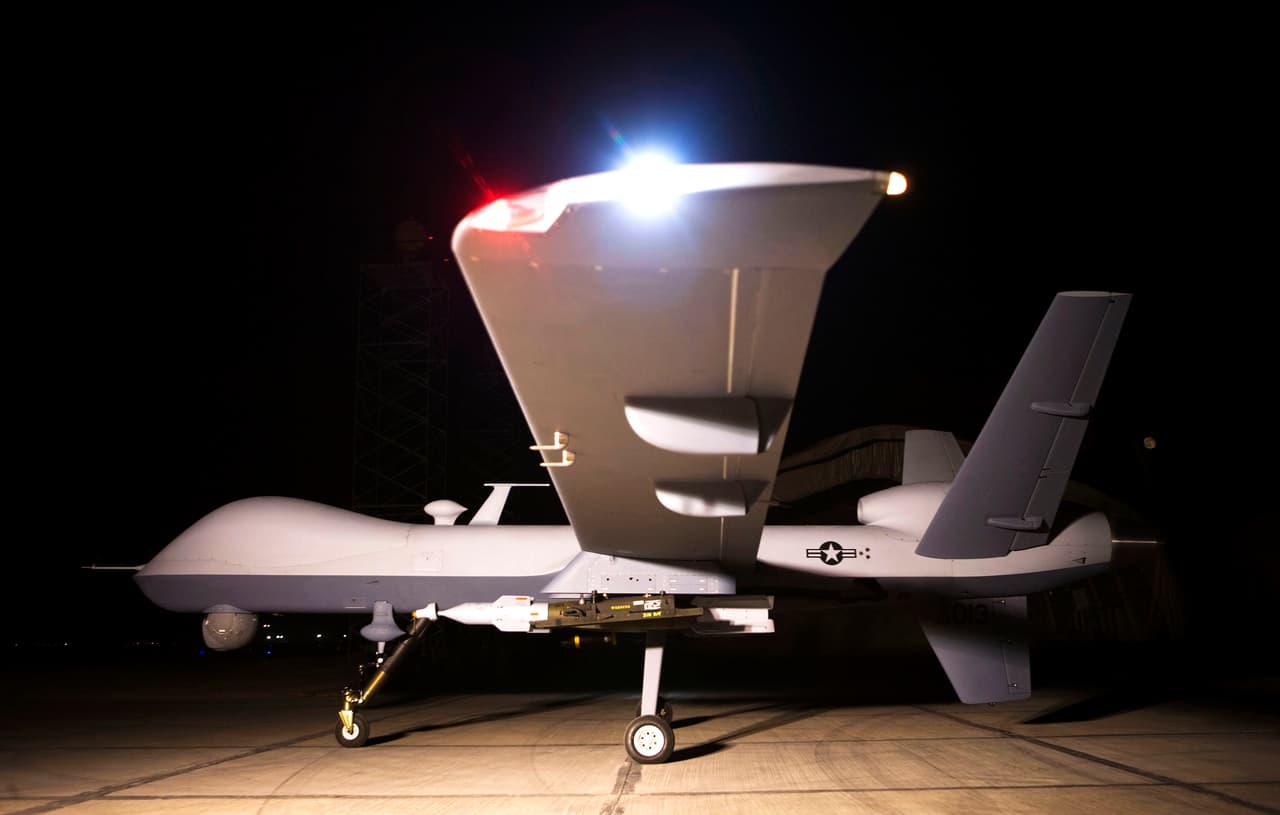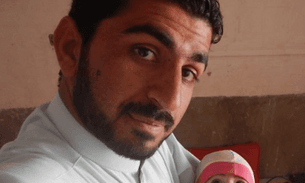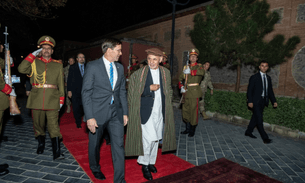
Monthly drone report: Total drone strikes under Obama in Pakistan, Somalia and Yemen now 491 after September attacks
A US Air Force Reaper in Afghanistan (Photo: US Air Force)
EXECUTIVE SUMMARY
i. Key points:
- CIA and Pakistan Air Force drones hit Pakistan’s tribal areas
- US strikes continue in Yemen as the civil war rages
- Al Shabaab continue to kill peacekeepers and civilians in Somalia
- The three drone strikes in Pakistan, Somalia and Yemen in September means a total of 491 drone strikes there under President Obama
- US air power helps stem the Taliban tide in Afghanistan
- Medecins Sans Frontiers trauma centre in Kunduz hit in October air strike
- The Bureau publishes investigation into UK’s Watchkeeper programme as Cameron doubles RAF drone fleet
ii. The Bureau’s numbers:
Recorded US drone strikes to date
|
Pakistan (June 2004 to date) |
Yemen (Nov 2002 to date)* |
Somalia (Jan 2007 to date)* |
Afghanistan (Jan 2015 to date) |
|
| US drone strikes | 421 | 107-127 | 15-19 | 48 |
| Total reported killed | 2,476-3,989 | 492-725 | 25-108 | 420-619 |
| Civilians reported killed | 423-965 | 65-101 | 0-5 | 14-42 |
| Children reported killed | 172-207 | 8-9 | 0 | 0-18 |
| Reported injured | 1,158-1,738 | 94-223 | 2-7 | 24-28 |
Recorded US air and cruise missile strikes to date
|
Pakistan (June 2004 to date)** |
Yemen (Nov 2002 to date)* |
Somalia (Jan 2007 to date)* |
Afghanistan (Jan 2015 to date) |
|
| US air & cruise missile strikes | N/A | 15-72 | 8-11 | 35 |
| Total reported killed | N/A | 156-365 | 40-141 | 79-104 |
| Civilians reported killed | N/A | 68-99 | 7-47 | 0-30 |
| Children reported killed | N/A | 26-28 | 0-2 | 0 |
| People reported injured | N/A | 15-102 | 11-21 | 5-6 |
* The Bureau’s estimates are based predominantly on open sources information like media reports. Sometimes it is not possible to reconcile details in different reports. This is why use ranges for our record of casualties and, in the case of Yemen and Somalia, our strike tallies.
** The US has only carried out drone strikes in Pakistan.
iii. Bureau analysis for September 2015:
Two drone strikes in Yemen plus one in Pakistan during September means the total strikes in the US’s covert drone war in those countries and Somalia during Barack Obama’s presidency now stands at 491.
September was the second consecutive month when US air and ground forces reportedly came to the aid of the Afghan army and security forces in their struggle to contain a brutal insurgency. US air attacks continued into October when a series of strikes hit a hospital run by international NGO Medecins Sans Frontier, killing at least 19 people, including 12 staff members.
A CIA drone strike hit Pakistan killing five or six people in the same month that Pakistan jets killed civilians in South Waziristan and the first Pakistan Air Force drone strike reportedly killed three people.
In Yemen the US continued drone strikes while the Saudi Arabia-led coalition of Arab and African states continued its air and ground war with the Houthi militia in the north, west and south of the country.
There were no US drone attacks reported in Somalia last month despite al Shabaab continuing to inflict a toll on African Union peacekeepers.
September also saw UK Prime Minister David Cameron announce Britain had killed two British men in a drone strike in Syria. This took the total number of Britons reportedly killed with drones to at least 10 – two by the UK and eight in US strikes in Pakistan and Somalia.
And in the first week of October, the Bureau published an investigation with the Guardian into the British Army’s flagship drone, Watchkeeper, as Cameron announced the RAF’s fleet of armed drones would be doubled to 20 aircraft.
MONTHLY REPORT BY COUNTRY
1. Pakistan
Pakistan: CIA drone strikes |
|||
| All strikes, September 2015 | All strikes, 2015 to date | All strikes, 2004 to date | |
| CIA drone strikes | 1 | 13 | 421 |
| Total reported killed | 5-6 | 60-85 | 2,476-3,989 |
| Civilians reported killed | 0 | 2-5 | 423-965 |
| Children reported killed | 0 | 0 | 172-207 |
| Total reported injured | 4 | 25-32 | 1,158-1,738 |
Download our full Pakistan data set here.
A single US strike hit Pakistan in September, a month that saw rare reports of civilian casualties from a Pakistan Air Force (PAF) strike and the Pakistan military declare it had used its own drones in combat in the tribal areas.
The CIA strike killed five or six people when it destroyed part of a house at around 11pm on September 1. Up to three of the dead were reportedly foreigners, they were believed to be Uzbeks.
At least 60 people have been killed in the 13 US drone attacks reported so far this year.
On September 7 the Pakistan military said it had used its own armed drone in the tribal areas. The attack killed three people – all reportedly senior militants.
On September 18 there were reports of a third drone strike in Pakistan’s tribal area. A CIA drone reportedly killed at least six people in South Waziristan. It subsequently emerged that the operation was carried out by the Pakistan Air Force.
There was little follow-up coverage of that attack because news broke of a bloody assault on a Pakistan Air Force base in Peshawar by the Taliban that killed at least 29 people.
But a Reuters journalist in Dera Ismail Khan, a region that borders the tribal areas, interviewed a family that was wounded in the attack. They said all the dead were their neighbours and civilians, not terrorists. They said eight or nine civilians were killed in the attack, including three women and at least three children.
2. Afghanistan
Afghanistan: US drone and air strikes |
|||
| All reported strikes, September 2015 | Official US figures, January to August 2015 | Bureau identified figures, January to September 2015* | |
| All US strikes | 17 | 282 | 83 |
| Total reported killed | 30-76 | – | 499-723 |
| Civilians reported killed | 0 | – | 14-72 |
| Children reported killed | 0 | – | 0-18 |
| Total reported injured | 0-6 | – | 29-34 |
* The Bureau’s data on US air and drone strikes in Afghanistan is not exhaustive. The ongoing war creates barriers to reporting drone strikes. The Bureau’s data on strikes in Afghanistan is an accumulation of what publicly available information exists on specific strikes and casualties. The US government publishes monthly aggregates of air operations in Afghanistan, minus information on casualties.
US Air Force data, January 1 to August 31 2015 |
|
| Total Close Air Support (CAS) sorties | 2,927 |
| Total CAS sorties with at least one weapon release |
282 |
| Total weapons released | 523 |
In September the Taliban launched a surprise assault on the northern city of Kunduz. US ground forces were dispatched to the city to aid Afghan security forces’ attempts to retake the city. And the US provided close air support to Afghan and US troops. These were the first US airstrikes reported on the city of Kunduz in 2015.
At least five US airstrikes on September 29 and 30 helped an Afghan counter offensive eventually drive the insurgents out of the capital of the wealthy Kunduz province, which is just 150 miles north of Kabul.
The Taliban assault and Afghan counter-attacks inflicted a heavy toll on the city’s civilian population. Medecins Sans Frontieres (MSF) reported that 296 wounded, including 64 children, had arrived at its trauma centre in Kunduz between September 28 and the start of October.
In October, the hospital was hit by several air strikes that left at least 22 people dead. MSF condemned the attack “in the strongest possible terms”. The charity closed the hospital after the attack, evacuating its staff. It had been the only free trauma centre in northern Afghanistan, MSF said.
US and European soldiers were reportedly involved in the effort to retake Kunduz with a US spokesman telling Reuters: “US Special Forces advisers, while advising and assisting elements of the Afghan Special Security Forces, encountered an insurgent threat in Kunduz city.”
The city’s Afghan garrison were driven out to the airport in the suburbs where they regrouped and waited for reinforcements. Special forces from the US were reportedly in the area and moved to the airport to assist. US soldiers called in air support on at least one occasions near the airport, reportedly destroying a tank captured by the Taliban.
UK and German soldiers were also reportedly involved, but British and German authorities have denied their forces were involved.
The month began with the Afghan security forces struggling to retake the district of Musa Qala in northern Helmand – a province in southern Afghanistan that saw fierce fighting between the Taliban and Nato forces. The US gave considerable air support to the Afghans, with 18 strikes in the final of week of August and seven in the first week of September.
After Musa Qala fell, 90 US special forces operatives were reportedly rushed to Helmand’s Camp Antonik military headquarters. This detachment reportedly included joint terminal attack controllers that “must be on the ground directing the strike to ensure they are conducted within our rules of engagement,” according to the US military spokesman in Afghanistan.
Few details emerged from the US strikes in Musa Qalas or Kunduz. The US military released some details but would not say how many people were killed. There were reports one attack in Kunduz killed 15, including Taliban shadow governor for Kunduz, Mawlawi Salam. However he subsequently denied reports of his demise, the Long War Journal reported.
Other attacks this month hit in Kunar, Paktika and Nangarhar – provinces that border Pakistan and where the majority of the reported strikes have concentrated.
The US tally of aggregated monthly data from August was published last month. It showed the number of airstrikes in Afghanistan nearly doubled from 45 in July to 84 in August – both far exceeding the monthly average of 35 per month after eight months. However this is still far lower than when US and allied soldiers were engaged in combat operations in Afghanistan.
3. Yemen
Yemen: all confirmed US drone strikes |
|||
| All strikes, September 2015 |
All strikes, 2015 to date | All strikes, 2002 to date* | |
| All US strikes | 2 | 20-21 | 107-127 |
| Total reported killed | 7-11 | 71-99 | 492-725 |
| Civilians reported killed | 0-4 | 1-7 | 65-101 |
| Children reported killed | 0 | 1-2 | 8-9 |
| Total reported injured | 2 | 8 | 94-223 |
Download our full Yemen data set here.
* All but one of these actions have taken place during Obama’s presidency. Reports of incidents in Yemen often conflate individual strikes. The range we have recorded in US drone strikes and covert operations reflects this.
There were two confirmed US drone strikes in Yemen last month, and two possible US attacks in addition.
The two confirmed attacks killed 9-11 people in Mukalla, a port city on the south coast of Yemen and the capital of Hadramout province. It has become the focus of al Qaeda activity in Yemen this year. It is also a focus of US strikes: 13 have hit since the start of the year.
The two possible attacks killed six in Mareb province in central Yemen. The Bureau cannot confirm US involvement in these strikes because the number of sources reporting US involvement is not sufficient, according to the Bureau’s methodology. Furthermore, the Saudi-led coalition has been bombing in Mareb and it is possible their attacks have been misreported as US attacks.
There were two other, possible US strikes that hit in Mareb province, central Yemen. These attacks were only reported by one or two sources and therefore are not included in the Bureau’s figures for confirmed US operations.
Last month saw foreign forces become more deeply embroiled in Yemen’s civil war, adding a new layer of complexity to the conflict as its toll on civilians continued to rise.
At the beginning of the month, a missile attack by the Shia Houthi militia in the central province of Marib killed at least 55 troops sent by Sunni Arab governments in the Gulf, who were there fighting in support of ousted president Abdu Rabbu Mansour Hadi.
Airstrikes by the Saudi-led coalition and heavy clashes occurred in different parts of the country, in spite of ongoing attempts by Oman to broker peace talks.
The Islamic State group reminded people of its growing presence in Yemen by claiming responsibility for a suicide bomb attack on a mosque in the capital, Sanaa, which was reported to have killed 25 people.
The Saudi-led coalition pressed on with an offensive in Marib. Towards the end of the month, Hadi returned to the southern city in Aden, which he had attempted to turn in to seat of government after Houthis overran the capital. The Houthis’ advance south forced him to flee the country in March.
September ended with a strike reportedly killing at least 130 civilians at a wedding party near the Red Sea port of Mocha. The attack was reported as a suspected airstrike, but a spokesman for the Saudi-led coalition insisted there were no flights in the area at the time.
4. Somalia
Somalia: all US drone strikes |
|||
| All strikes, September 2015 | All strikes, 2015 to date | All strikes, 2007 to date | |
| All US strikes | 0 | 8-9 | 9-13 |
| Total reported killed | 0 | 7-75 | 23-105 |
| Civilians reported killed | 0 | 0-4 | 0-5 |
| Children reported killed | 0 | 0 | 0 |
| Total reported injured | 0 | 0-4 | 2-7 |
Download our full Somalia data set here.
The militant group al Shabaab went on the offensive in September, seizing towns in the Lower Shabelle region.
On September 1 reports emerged that the group had raided an African Union base in Janale, killing at least 12 peacekeeping troops. By the second half of the month, the acting governor of Lower Shabelle told Reuters that much of the area was in al Shabaab’s hands, including Janale.
Also in September, the UK announced at the end of the month that it would send up to 70 troops to support the African Union mission in non-combat roles.
Follow our drones team Jack Serle and Abigail Fielding-Smith on Twitter.
Sign up for monthly updates from the Bureau’s Covert War project, subscribe to our podcast Drone News, and follow Drone Reads on Twitter to see what our team is reading.


